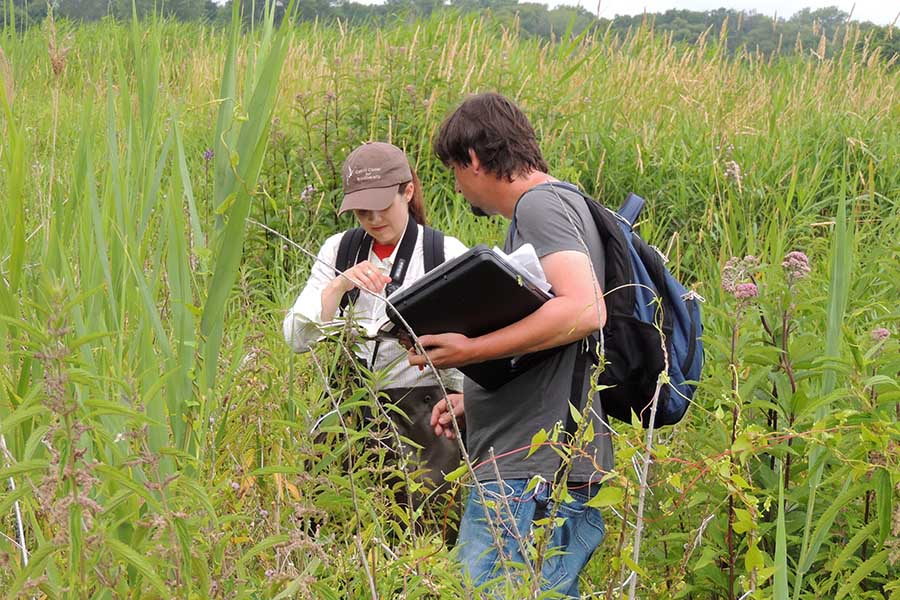Student Opportunities
the Heart & Soul
of the Center
Everything we do is with students in mind.
Students like you are the foundation of our center. We build activities based on student experience to ensure you're growing as a scientist through our work. What you do here represents a transitional opportunity – segue between classroom, getting a degree and getting a career. You'll dabble in different areas of conservation to find your place, from on the ground restoration efforts to data collection to species identification to community outreach.

Employment Opportunities
Get on the fast track to your future career. Through hands-on field experience, you can expand your network, build your skills and get personal and professional mentorship.
Data Management Assistant
- Assists with data organization, management and digitizing of project files, information, data forms, periodicals, etc.
- Populates and manages online database of CCB images, photographs, etc.
- Conducts data entry as needed.
Herbarium Assistant
- Process and prepare specimens: pressing, mounting, labeling, accessioning and filing.
- Maintain detailed and accurate records of the use of the collection.
- Maintain the museum work area by regularly sorting and filing materials, editing the computer database and occasionally sweeping floors and wiping down countertops.
- Digitization of the collection: barcoding, photographing and managing collection data and metadata.
Stewardship, Restoration and Research Assistant
- Contribute to tracking work conducted on the natural area either with a handheld GPS unit or by uploading data to ArcGIS Online.
- Conduct invasive plant control by: hand pulling, hand wicking, brush cutting, lopping, herbicide spraying and other methods.
- Install native plants including plugs, and tree and shrub seedlings and caging or tree tubes.
- Prepare for and follow up on stewardship workdays, including loading and cleaning equipment and vehicles; conduct shed maintenance/cleaning, record keeping, alert UW-Green Bay staff of needed supplies.
Volunteer With the CCB
Volunteering is a great way to try out research and field activities in field biology and environmental science. You can acquire skills and "out-of-the-classroom" experience to build a strong resume without the commitment of a job.
Learn Across the World
Every year, a group of students and faculty travel to Panama to participate in a variety of exciting research projects in collaboration with the Smithsonian Tropical Research Institute. This course is designed for junior or senior undergraduate and graduate students with previous biodiversity related research, coursework or travel experience. You'll likely be developing projects along Pipeline Road, 17+ km corridor that extends into Soberania National Park (Parque Nacional Soberania, or PNS) from Gamboa Township. This road is considered to be one of the best birding locations in all of Central America, if not the world.
- Comfortable lodging is included for the duration of the program in Gamboa, a small town located 30 km north of Panama City.
- Most meals are provided.
- The research schedule is busy, but there will also be opportunities to take in the sights and to relax.
- Recommended travel vaccinations are available at the Centers for Disease Control.
Past Projects
- acoustic monitoring of tropical birds and bats in pristine tropical rainforest
- fossil collection in the Panama Canal Zone with a team of Smithsonian paleontologists
- testing of a new rapid assessment protocol to sample arthropods in lowland rainforest and cloud forest
- monitoring marine organisms in a Caribbean coastal ecosystem
- collection and identification of fish species and their parasites in tropical rainforest streams
Fees & Applications
In general, you'll be expected to provide current transcripts, complete an essay and provide letters of recommendation when they apply. You must have a current passport at the time of your application. Application deadlines are usually in late May.
Expect to pay between $2000 and $2500. Student fees as well as costs for equipment are subsidized by The 1923 Fund. The 1923 Fund is an active supporter of 3 participating institutions and has long been interested in biodiversity related issues.
Ask an Expert
Meet Erin Giese, Associate Director of the Cofrin Center for Biodiversity. She champions student experience and truly enjoys training the next generation of scientists. If you're wondering what opportunities there are as a student, Erin or any of our employees at the CCB can help.